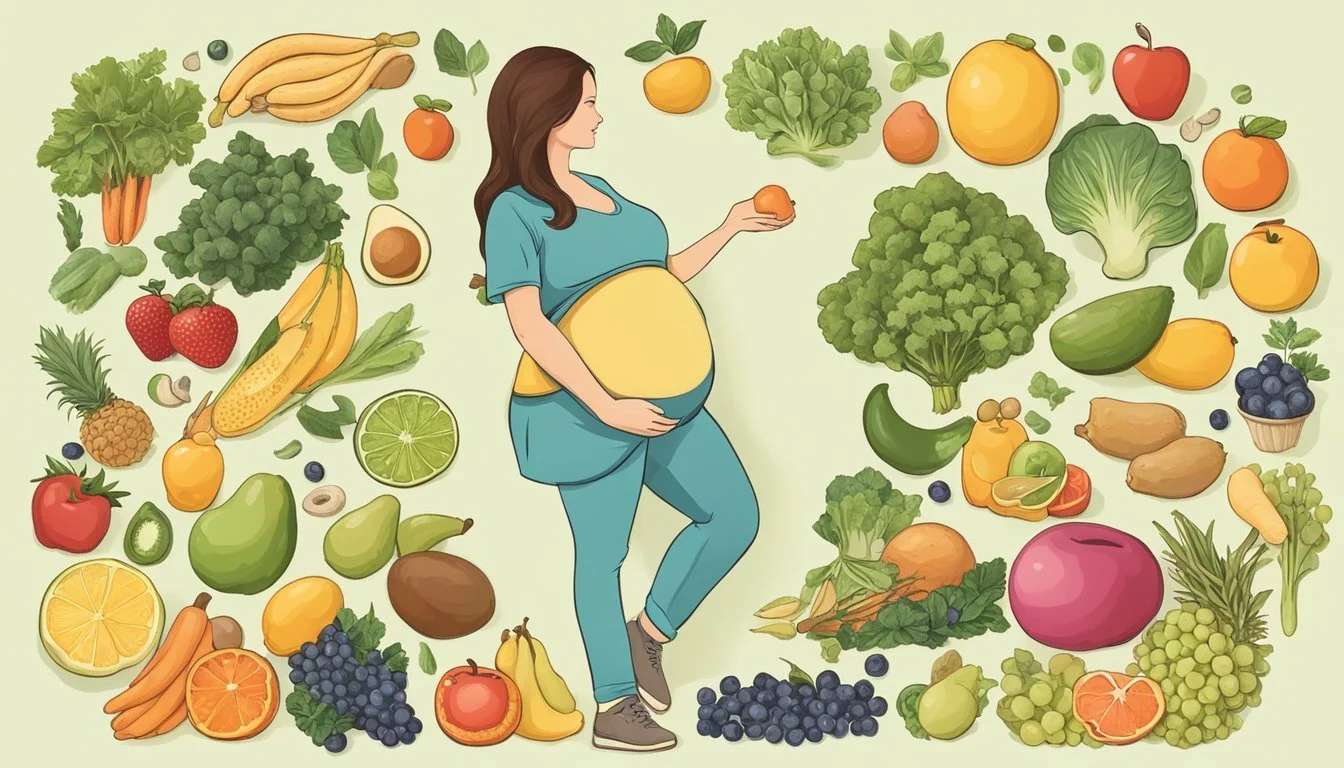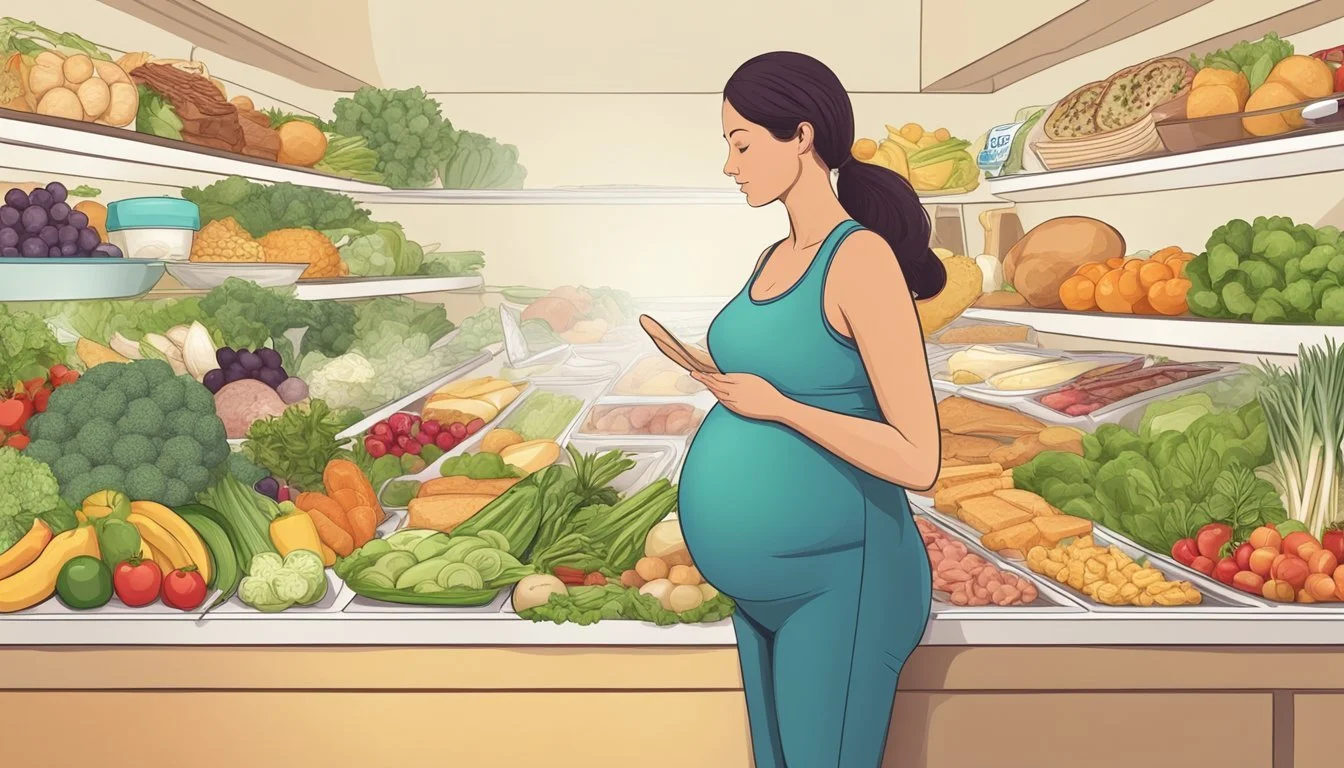Is It Safe to Follow the Dukan Diet While Pregnant?
Evaluating Nutritional Concerns
The Dukan Diet, a high-protein, low-carbohydrate eating plan, has gained popularity for its straightforward approach to weight loss. It consists of four phases, each designed to promote rapid weight reduction through a structured sequence of dietary restrictions, with a heavy emphasis on lean proteins and the minimization of fats and carbohydrates. While the diet promises a path to sustainable weight management for the general population due to its strict regimen, the considerations drastically change when it comes to pregnancy.
During pregnancy, a woman's nutritional needs increase significantly to support the growth and development of the fetus as well as maternal health. It is essential that expecting mothers consume a balanced diet rich in vitamins, minerals, and macronutrients. Therefore, any restrictive diet like the Dukan Diet, which limits the intake of certain food groups, becomes a matter of concern for obstetricians and nutritionists. They caution that the dietary limitations inherent to this diet may not align with the comprehensive nutritional requirements during pregnancy, potentially impacting both the mother and the developing fetus.
Safety during pregnancy is a paramount concern, and any alterations to a standard diet should be approached with caution. The Dukan Diet's focus on high-protein intake and restriction of other vital nutrients could lead to nutritional gaps when special requirements of pregnancy need to be met. For this reason, it is generally advised that pregnant women seek personalized dietary advice from healthcare professionals who can provide tailored recommendations to ensure both the mother's and the baby's health needs are sufficiently met.
Overview of the Dukan Diet
The Dukan Diet emphasizes high protein consumption and low intake of fats and carbs to promote weight loss. It is structured into four distinct phases, each with its own set of rules and food choices.
Basic Principles of the Dukan Diet
The Dukan Diet is based on the idea that increasing protein intake is a key factor in weight loss. Proteins are more satiating than fats and carbs, which can lead to a decrease in overall calorie intake. The diet restricts the consumption of fats and carbs, thereby encouraging the body to utilize stored fat for energy. Oat bran is a staple in this diet for its high fiber content, which can aid digestion and promote a feeling of fullness. The diet's creator, Pierre Dukan, advocates for eating 100 specific low-fat, high-protein foods as part of the plan.
Four Phases of the Dukan Diet
The Dukan Diet consists of four phases, each designed to promote sustainable weight loss:
Attack Phase: This initial phase is highly restrictive, focusing on 68 pure protein foods such as lean meat, fish, eggs, and fat-free dairy products. It is intended to kickstart weight loss with a protein-rich diet for 1 to 7 days.
Cruise Phase: During this phase, 32 specific vegetables are introduced, providing some variety. The cycle of pure protein days and protein-and-vegetable days is meant to promote a steady loss until reaching the target weight.
Consolidation Phase: To prevent the rebound effect, this phase gradually reintroduces previously restricted foods like fruit and cheese, along with some starchy foods and carbs. Certain protein-rich foods remain the foundation, and there are occasional celebration meals.
Stabilization Phase: The final phase is the long-term maintenance part of the diet. There are no specific food restrictions, but the principles of the diet, such as one pure protein day per week and regular consumption of oat bran, are intended to be maintained for life to prevent weight regain.
Nutritional Considerations During Pregnancy
During pregnancy, a woman's body requires additional nutrients, vitamins, and minerals to support the growing fetus. The quality of a pregnant woman’s diet can significantly affect not only immediate maternal and child health outcomes but potentially also these individuals' long-term health.
Importance of Balanced Nutrition
A balanced diet during pregnancy supports the health of both the expectant mother and the developing fetus. It is critical for the prevention of birth defects, proper fetal growth, and reducing the risk of chronic diseases. Adequate nutrition helps sustain the mother’s energy levels and may alleviate some common pregnancy-related symptoms.
Specific Nutrient Needs in Pregnancy
Nutrients: Pregnant women need more protein, essential for the baby's growth, especially in the second and third trimesters.
Vitamins: Prenatal vitamins are often recommended to ensure the mother receives adequate folate, which helps prevent neural tube defects, and iron, to prevent anemia and promote the development of the baby's blood supply.
Minerals: Calcium is crucial for building the baby's bones and teeth and may be obtained through dairy products, fortified foods, or supplements.
Fiber: A high-fiber diet is important for preventing gestational diabetes and constipation, common issues during pregnancy. It also assists in maintaining stable blood sugar levels.
Hydration: Staying well-hydrated is vital for increasing blood volume, which supplies the fetus with nutrients and oxygen and can help prevent urinary tract infections, which are common during pregnancy.
Evaluating the Dukan Diet for Pregnancy
When considering the Dukan Diet during pregnancy, one must critically assess how it aligns with standard dietary guidelines for pregnant individuals and understand the potential health implications.
Comparison with Pregnancy Dietary Guidelines
The Dukan Diet, which emphasizes a high-protein, low-carbohydrate regimen, diverges significantly from conventional pregnancy dietary advice. Standard guidelines recommend a balanced intake of fruits, vegetables, whole grains, and a moderate amount of proteins. They stress the importance of a variety of nutrients that are essential for fetal development, including folic acid, iron, calcium, and fiber. In contrast, the Dukan Diet's initial phases limit the consumption of whole grains, fruits, and some vegetables, which could lead to deficiencies in these vital nutrients.
Potential Risks and Concerns
There are several health concerns for pregnant women following a high-protein, low-carbohydrate diet like the Dukan Diet. First, excessive protein intake can place added strain on the kidneys, which are already under increased stress during pregnancy. This diet's restrictions on carbohydrates can also result in water loss rather than fat loss, leading to dehydration, which is especially hazardous during pregnancy.
Constipation, headaches, and dizziness are common side effects of this diet due to the limited intake of fiber-rich fruits and grains. Moreover, the body’s shift to a ketogenic state can result in the production of ketones, potentially leading to ketosis, a condition that is not recommended during pregnancy due to potential effects on fetal development.
While animal proteins are included in the diet, they lack other nutritional elements essential for pregnancy, which are often found in a more varied diet. Pregnant individuals should consult with a registered dietitian or nutritionist to ensure their diet meets the developmental needs of the fetus while maintaining the mother's health, rather than following a restrictive weight-loss oriented diet like the Dukan Diet.
Potential Impact of the Dukan Diet on Fetal Development
The Dukan Diet is a high-protein, low-carbohydrate diet that restricts fats and carbs while emphasizing protein consumption. When considering this diet during pregnancy, it's important to reflect on the nutritional requirements necessary for fetal development.
Pregnant individuals require a balanced intake of nutrients, including proteins, fats, carbohydrates, vitamins, and minerals. These nutrients play critical roles: proteins support growth, healthy fats contribute to neural development, carbohydrates provide energy, and a wide array of vitamins and minerals underpin various developmental processes.
High-protein foods, a staple of the Dukan Diet, can be beneficial as they contribute to the growth and repair of fetal tissues. However, a diet low in carbohydrates can potentially lead to inadequate glucose, which is crucial for fetal brain development. Likewise, fat is not only a major energy source but also supports the absorption of fat-soluble vitamins vital for development.
Furthermore, the Dukan Diet's limitation on certain food groups may inadvertently lead to a deficiency in essential vitamins and minerals. For example:
Vitamin B9 (Folic Acid): Critical in reducing neural tube defects.
Calcium: Essential for developing the fetal skeletal system.
Iron: Prevents anemia and promotes fetal growth and development.
Nutrient deficiencies can lead to compromised fetal health and development. Therefore, when adapting any diet during pregnancy, one should seek guidance from healthcare professionals to ensure that the dietary pattern includes all quintessential components for fetal growth. It is generally advised to adopt a well-rounded diet with a variety of food groups during pregnancy rather than following restrictive diets like the Dukan Diet.
Alternatives to the Dukan Diet During Pregnancy
When considering dietary plans during pregnancy, it is crucial to prioritize a balanced intake that supports both maternal and fetal health. The Dukan Diet, predominantly a high-protein, low-carb regimen, may require adaptations to meet the nutritional needs of expectant mothers.
Adapting the Dukan Diet for Pregnancy
The Dukan Diet, which is low in carbohydrates and high in protein, typically excludes certain food groups that are essential during pregnancy. Expectant mothers may adapt this diet by incorporating a variety of nutrient-dense foods. It is important to add:
Fruits and vegetables: Aiming for a colorful array to ensure a wide range of vitamins and minerals.
Whole grains: Providing essential fiber and nutrients that support fetal development.
Beans and legumes: Offering a good source of protein and iron which are crucial during pregnancy.
Nuts: To include healthy fats and protein that are beneficial for both the mother and the developing fetus.
Incorporating these foods ensures that pregnant women get a balance of macronutrients (carbohydrates, protein, and fats) as well as micronutrients necessary for healthy pregnancy outcomes.
Healthier Diet Options for Expectant Mothers
Expectant mothers should consult with healthcare providers to design a diet plan that is both nourishing and safe. Healthier diet options would typically include:
A variety of fruits and vegetables, particularly those rich in folic acid, like leafy greens, which help prevent neural tube defects.
Whole grains, such as brown rice or oatmeal, which supply the necessary energy and fiber.
Protein sources like lean meats, beans, and nuts, are essential for the baby's growth.
Non-starchy vegetables, including a mix of colorful vegetables, ensuring an array of nutrients.
To summarize, diets during pregnancy should focus on balance, variety, and nutrient-density to support the health of both mother and child.
Opinions from Medical Experts
Medical experts, including registered dietitians and nutritionists, have expressed concerns about the safety of following the Dukan Diet, especially during pregnancy. The Dukan Diet, created by French physician Dr. Pierre Dukan, promotes a high protein and low carbohydrate intake, thus breaking it down into several phases. While some individuals cite the diet's strict regimen for initial weight loss success, it has not been extensively researched within the context of pregnancy.
Health Risks: There is consensus among experts that pregnant women need a well-balanced diet to support fetal development. A review of dietary needs during pregnancy suggests that restrictive diets like Dukan may lead to nutritional deficiencies. It may lack in essential components such as:
Adequate fiber
Vitamins
Minerals
Healthy fats
Expert Commentary: A quote from a nutritionist underscores these concerns: "The Dukan Diet is too rigid and lacks in vital nutrients that are crucial for both the mother and the developing fetus." Experts often reinforce the import of a varied, nutrient-rich diet during pregnancy rather than a high-protein, carbohydrate-restricted plan.
Research and Reviews: Due to limited research on the Dukan Diet during pregnancy, experts suggest erring on the side of caution. In reviews, medical professionals advise against adopting any weight loss-oriented diet during pregnancy unless under direct supervision by a healthcare provider. They emphasize the potential for health risks outweigh the benefits when considering the diet's strict nature and potential nutritional gaps.
Conclusion
The Dukan Diet, primarily focused on high protein and low carbohydrate intake, is not recommended for pregnant women. Pregnancy necessitates a diverse range of nutrients to support the health and development of the fetus, which the restrictive nature of the Dukan Diet does not adequately provide.
Key Considerations:
The diet's strict rules and elimination of food groups can lead to nutritional deficiencies.
Pregnancy requires an increase in calories and nutrients which the Dukan Diet may limit, thereby not supporting a healthy lifestyle for both the mother and the developing baby.
The diet emphasizes rapid weight loss, which is not advisable during pregnancy as it can affect fetal growth.
Experts agree that a balanced diet, encompassing all food groups, is essential during pregnancy. It is critical to consult healthcare providers about sustainable, healthy lifestyle choices that ensure both maternal and fetal well-being.
Pregnant individuals should focus on a diet rich in:
Fruits and vegetables
Whole grains
Lean protein
Healthy fats
Fiber
Following a specialized diet like the Dukan Diet while pregnant could lead to long-term lifestyle alterations that might not be beneficial or sustainable. Health and nutrition during pregnancy should cater to the increased physiological demands and support optimal fetal development, something the Dukan Diet might not adequately service.









